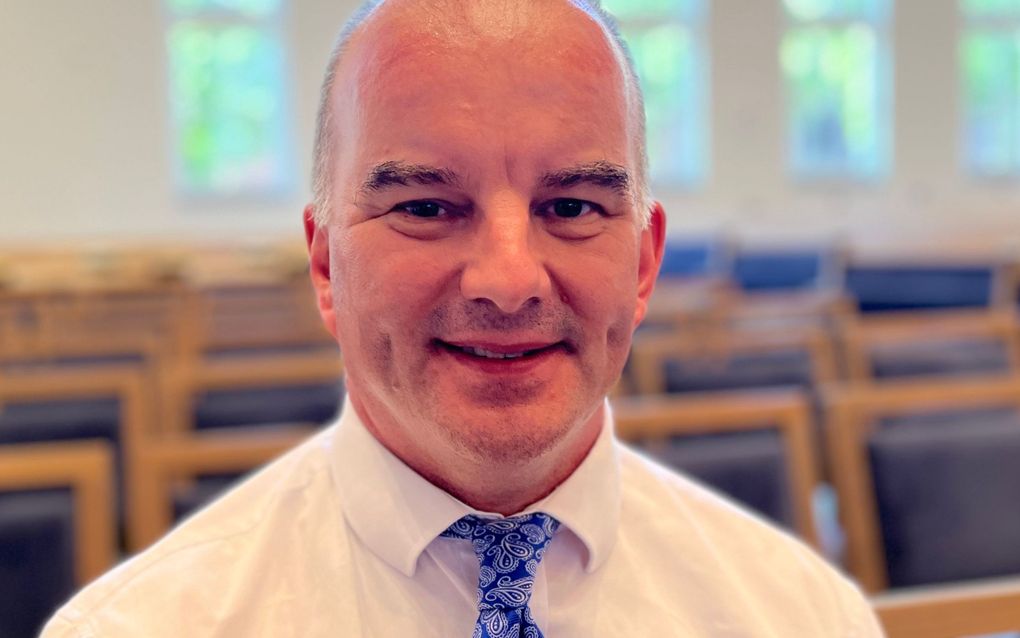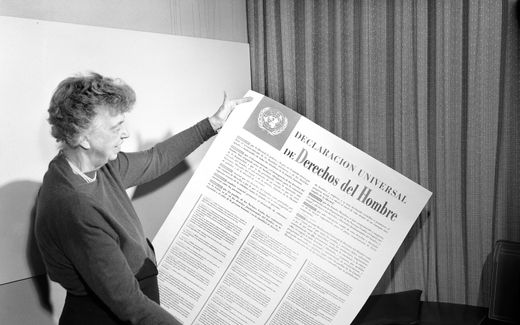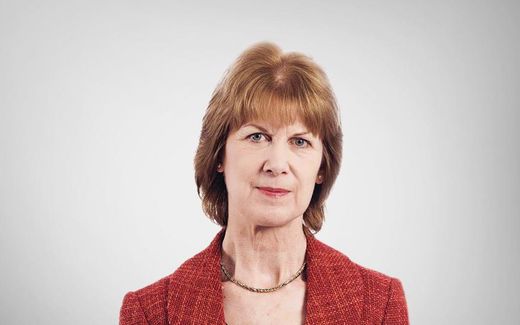Carl Trueman: How should Christians live in a world where people put themselves first?
17-12-2024
Partner Content
Carl Trueman, BBMV

Carl F. Trueman. Photo CNE.news
Partner Content
“A big shift has taken place. In today's world, it's all about feeling good. As a result, we have become inwardly focused. We have created a therapeutic sense of self,’ professor Carl Trueman says. He spoke at the 2024 BBMV-conference ‘Self-worship as a new religion’. Trueman is the author of the book ‘Strange New World’, points to an important shift for Christians, initiated in the last century. How should Christians live in a world where people put themselves at the center?
Believing in another world
Trueman: “Why is the world upside down? A logical answer might be: because of sin. But such a general answer doesn't clarify why the next generation considers things differently from mine. The way we deal with the world has nothing to do with arguments. As Protestants, we emphasize the Word of God. With that, we may be tempted to think that arguments are the most important thing in shaping someone else's worldview. But most people think in terms of how they imagine the world. And an imagination is much more complicated than an argument.
Looking at shifts regarding same-sex marriage in American culture between 2005 and 2015, there was a huge transition. That shift occurred not through reading books and arguments about marriage, but through complicated forces at work in culture. Consider soap operas and friendships. Gay couples became more visible in our immediate environment. That stamped our worldview more than arguments.”
“Gay couples became more visible in our immediate environment. That stamped our worldview more than arguments.”
Using his grandfather as an example, Trueman points out the difference between the perception of today's generation of young people and a hundred years ago. “My grandfather was a metal worker in Birmingham, the industrial heart of the UK. His whole life he worked in the car industry. If I were to ask him, ‘Grandpa, did your job give you satisfaction; did you enjoy your work?’, he would not be able to understand the question, because in his time, such questions would never have been asked. I would have to explain what I meant by it, to which he would reply that he obviously considered his work valuable because there was a need to earn a living. Think about this. Work was valuable to earn a living for the family.
As his grandson, if my grandfather asked me that same question, I would say, “I find it satisfying to speak for so many people and see them brighten up.” What stands out? My answer is only about me. It makes me feel good. This is how we look at the world around us today and this is the exact shift that has taken place. The goal of our lives is to have a good life. With that, we have created a therapeutic self-image focused on self-worship. This causes us to be inwardly focused, while the apostle Paul calls his listeners to live a self-sacrificial life so that we can serve others.”
Three time periods
“By highlighting three time periods I would like to illustrate the dramatic changes in society. The first is the year 1248 when people started building the Cologne Cathedral. At that time, life was agrarian and strongly determined by seasons and external authority. People rarely travelled far and their lives were geographically and socially limited. In those days, you were baptized, married, and buried in the same church where your ancestors were baptized, married, and buried. The same applied to your descendants. You were anchored. Nowadays, however, we live in a time in which we can choose how and where we want to live. Therefore, the modern man identifies himself much more closely than in 1248.
‘Technology has made it possible to ‘overpower’ nature because we no longer have to follow the seasons.’
The second period is 1522 in Zurich during the time of fasting (Lent). The Swiss Reformation began with Christoph Froschauer, a printer, cooking and eating sausages with his employees during Lent, under the watchful eye of reformer Ulrich Zwingli. Lent was aligned with the rhythm of the liturgical calendar. However, a printer's work was not tied to seasons. After all, print shop employees had to eat every day to do their work. This explains why sausages were cooked during Lent, which was important for Roman Catholics. This is how Froschauer turned the liturgical year upside down. This event is characteristic of the transition to a new era.
The technology of the printing press allowed time to be technologically controlled. With it, the perception of time changed. Technology made it possible to ‘overpower’ nature, because we no longer had to follow the seasons. At the time, this was a very far-reaching development and, as a result, man's imagination started to shift: for every problem we will find a human, technological solution. Our brain has a solution for everything. In this way we can use our technology to beat nature and everything comes under human control.
Now we are living in the summer of 2024 (the third time period, ed.). Life is fluid and chaotic. Technology has led us to believe that we can overpower nature. This leads to a sense of insecurity and a constant search for self-identity. Technologically, our world has accelerated, which leaves us with a sense of constant backwardness and chaos. This partly explains the problems young people experience today. Technology makes it harder to have a solid sense of self. Rapid technological changes force us to have to adapt constantly, leading to a sense of insecurity. Meanwhile, sexual desires are often seen as a source of identity and fulfilment. This helps explain why the world is so much focused on sexuality and identity.”
‘As Christians, we often tend to see the church as a response to God's grace. But the strength of the church is precisely that it does not depend on our human strength.’
Trueman notes that what is sacred, is being trampled on today. “The essence of our times is: violate what is sacred,” he says. To illustrate, he refers to the practice of abortion. “In the 1990s, abortion was seen as a necessary evil. Now abortion is seen as a human right and people come out openly for it. So, we live in a time in which sin is boasted about.”
What is the right answer?
In response to the above developments, Trueman points to the power of the church. Everything we as Christians do in public life should be done realising that with the church we have a powerful instrument in our hands. The church is not people's work; it is God's work. As Christians, we often tend to see the church as a response to God's grace. But the strength of the church is precisely that it is not dependent on our human strength, it is a means in the hands of a sovereign God. Therefore, preaching is more than giving a lecture. A preacher is in the pulpit for a reason. The pulpit occupies a visible, central place because God's Word is central. The proclamation of God's truth is the answer to modern problems.
Why does God forbid sexual acts by non-heteros? Not because God is some arbitrary tyrant, but because certain discourses are contrary to Biblical teaching. The world around us assumed these Biblical views in the 70s and 80s, but as the culture has become detached from Biblical normality, things have changed. “I remember as a family we went on holiday to a B&B in North Wales. In one of the other rooms was an unmarried couple and my mother was shocked. But today Christian morality is the enemy of social imagination. This has put Protestants, in particular, in a difficult position. Therefore, we must impart Christian teachings to the new generation as a salutary foundation.”
Singing together and the power of liturgy
According to Trueman, Christians must teach their children to function within a community. “Why is singing together so important? When you sing together, you cannot be individual. You sing freely from your heart, but you sing in the same way and the same words as those around you. Today, the earplugs go in and you are isolated from the rest of the world. Thus, the collective aspect of music is being killed. Music has shown that we are not autonomous individuals. That is why Luther gave the order to sing as a whole church; an essential part of the Reformation.
‘Friendship is one of the attributes of God. As Christians, we should rediscover the concept of friendship.’
“Let us also consider the rhythm of the liturgy. Some liturgies are more formal than others. However, it begins with the call to worship; a preacher brings people into God's presence with the votum; Scripture is read from; the confession of faith is proclaimed; people sing in thanksgiving as their response to the preached word; and the blessing is given. This is a powerful exposition of the gospel. When you encounter this every week, your self-image is formed. That is why the rhythm of the liturgy is very important. This is how we learn what it is to be human in a world created by God. A liturgy is purposeful and points people towards their eternal destiny.”
Friendship and hospitality
“Friendship is one of the attributes of God. When Moses encountered God in the tabernacle, God spoke to him as a friend. Today, we are going through a crisis of friendship. It was very common in Bible times for Jonathan and David to talk about each other in the way they did, as real friends. Now it is cool not to be hetero because our new generation does not know what friendship means. Recently, I heard about a class where eighty percent of the girls were said to be lesbians. As Christians, we should rediscover the concept of friendship. Let the older generation lead by example in this regard!
Loneliness is a side effect of the sexual revolution. The epidemic of loneliness is a problem to which the church has an answer. Maybe you remember people who were hospitable to you. When I went for my PhD, I ended up living alone in a big city. A woman from the church asked me to have lunch with her after the service. I still remember who she is. Hospitality is a Biblical principle: ‘Therefore love the stranger, for you were strangers in the land of Egypt’, the Lord told the people of Israel. When you open your home you are signalling that you are not on your own. That is why Christians have a mission to be hospitable.”
Related Articles




